#World building
Text
Reverse First Contact AU
[Technology Introduction]
The technology of the Transformers themselves has been fully assimilated and harmonised with human life.
The moment the Transformers landed on Earth they essentially disappeared. Their foot print hidden. Falling in place of the sudden shroud of tech and buildings that humans learned to create from the experimentations that immediately arose from them.
Experimentations some may have not survived. All components pulled apart and recycled like the rest of humanity's machinery.
Until it eventually one day it stopped. Leading to the research and preservation of this rare exotic line of specimens.
Due to the world wide abundance of the energon tech. Some wrongly believe that the Transformers were built by humans and that even the little known history of the alien species is actually entirely made up for emersion of these new 'attractions'.
The wildly varied enclosures provide accessibility to a myriad of security risk potentials everyday. And the walls are the only thing separating the fascinating bots from the public.
#transformers#creative writing#writing#Reverse First Contact AU#transformers g/t#enclosures#world#world building#maccadams#future technology#a bit depressing but they might figure something#lore drop before rushing to lectures this morning#keeping that old gods feel
37 notes
·
View notes
Text
HIERARCHY OF
DREAMTALE
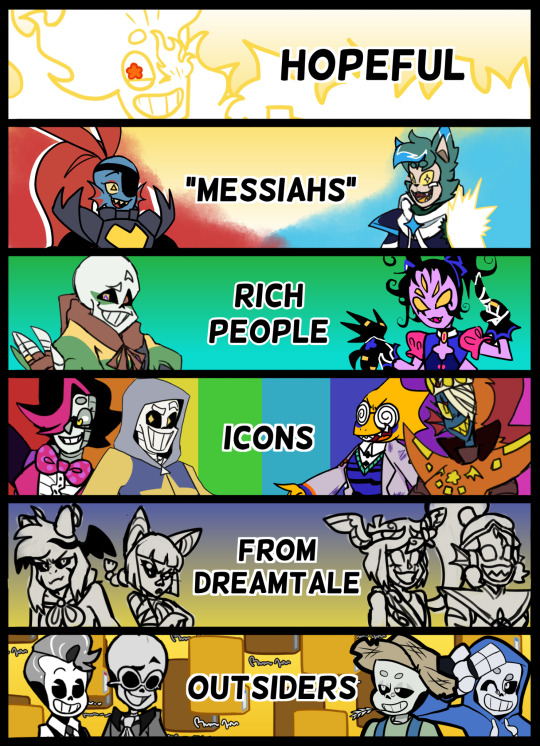
The hierarchy is important but it's not at the same time, because people that are more down in the hierarchy don't even knowledge it's existence, but the people above it knows it.
Let tell you the details:
Hopeful is above everyone because he's THE HOPE, you should thank him just for existing.
Messiahs are people who help people across the multiverse, they're are sort of semi-gods, "blessed" by Hopeful, Neil uses his powers to organize the doodle-sphere avoiding it from crashing, Soul helps people in danger and bring them to Dreamtale. Both help Hopeful in a way.
Rich people are... self-explanatory, even thought dreamtale has socialist characteristics it also has capitalist characteristics (politics, out of nowhere, holy shit)
Icons are the people who represents a color in the rainbow system, and each color represent an element of harmony, which are 9 now: Empathy, generosity, laughter, humility, loyalty, honesty, bravery and... and magic... (is that an MLP FiM reference?????). They help to maintain the harmony inside dreamtale, while the messiahs do it outside dreamtale.
From dreamtale, weren't presented yet, even thought their designs aren't ready, without colors, i replaced some of Joku's OC's (that's not an offense) with undertale chrs, because... cuz' i wanted to :/. People from dreamtale are above Outsiders because they were born in dreamtale, they're "already blessed", they were born in "the paradise"
Outsiders are people from the multiverse, other AU's, rescued or not, that aren't from the rainbow system. They go there searching for a better life.
The drawings are kinda ugly but what matters is that it's showcasing the thing it's suppose to... if you did read that... i love you.
Credits:
Dreamtale, and the characters Dream, Neil, Grapes, and the concept of the characters Death, Life (Quetzacoalt) and Magic(Lanny) are by Jokublog
Soul (c) Tatatale
Ink sans (c) Comyet
Underfell (c) Vic underfella
Lust MTT (c) NSFWshamecave-pb
Horror Undyne (c) Sour-Apple-Studios
Murder/Dust sans (c) Ask-dusttale
Greaser (c) Radsee
Fresh (c) LoverofPiggies
Farmtale (c) Guinongtale_AU
Dancetale (c) Teandstars
💖
#invertedverse#undertale au#utmv#utmv au#ut au#undertale alternative multiverse#undertale#undertale aus#ut aus#ut sans#utmv sans#utmv fanart#world building#dreamfate#dreamtale au#dreamtale dream#inverteddream#invertedhopeful#undertale alternative universe#undertale alternate universe#undertale alternate timeline#au undertale#au sans#sans au#sans aus#undertale multiverse#multiverse au
27 notes
·
View notes
Note
I have a question! What's a Soulfetcher?
A soulfetcher is a type of bird!
It is characterized by having four red or yellow eyes, four large wings, sharp talons, and a long, thick beak.
They look similar to crows and ravens but are bigger than both and are roughly the same size as an Andean Condor.
Their calls are known to spook travelers, hikers, campers, among other people, mainly because they closely mimic that of a screaming and dying person.
They can also parrot noises (specifically will parrot voices of people), and are highly intelligent.
All of these traits are what gives them the nickname of “death’s messenger” or “deaths omen”, since it’s believed that they parrot the voices of those that have passed.
They’re also believed to be omens of death. In some cultures, they are a negative omen that someone will die. While in others, they are a signifier of a peaceful death or of a dead relative visiting.
They are rarely seen, only typically heard.
Morgana’s ruling family (the De La Dáinn family) is known to house these birds in their gardens.
A while ago, you could find the youngest member outside at night, feeding them and talking to them. Although, she’s since grown up and isn’t at home anymore.
#bowl mixes#world building#the tales of selcouth#the crux#Pandora de la dáinn#writeblr#writing#writers on tumblr#original character#oc#original oc#original story#original writing#writeblr community
15 notes
·
View notes
Text
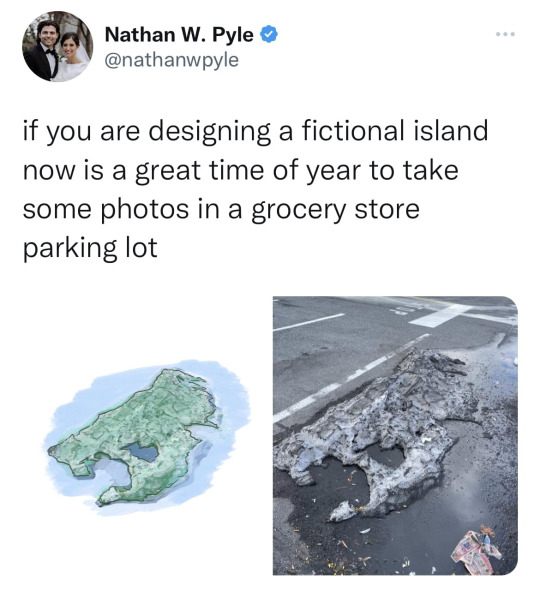
This came across my Facebook feed, felt I’d share it.
48K notes
·
View notes
Text
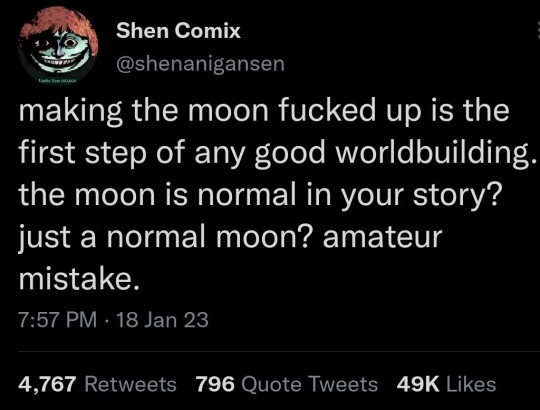
56K notes
·
View notes
Text

Daily drawing 1531: Whatever magics created the landmark sword, keep it to this day. Only wear from a long forgotten battle marks the blade, Time bearing no power over the strange metal. But to whatever end the sword was forged, Time has claimed its rightful position of being the sole keeper of that memory.
#digital art#procreate#artist#illustration#artists on tumblr#landscape art#landscape#original art#fantasy#fantasy landscape#sword#world building
4K notes
·
View notes
Text

2K notes
·
View notes
Text
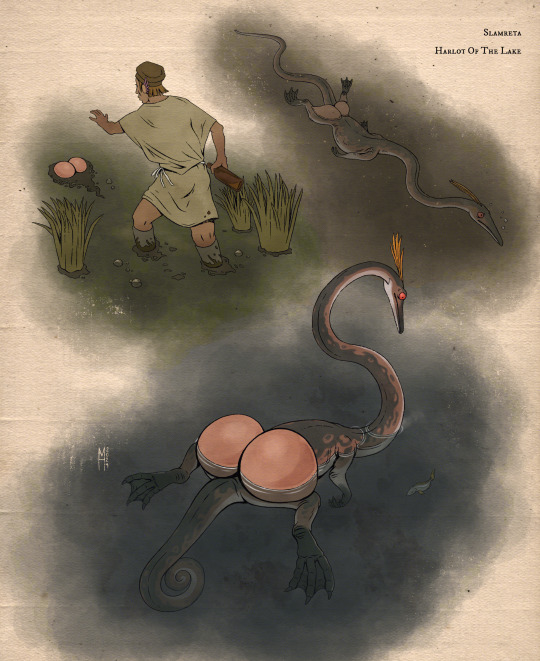
You're drunkenly stumbling home one night and from the duckboards through the booze haze you see the most scrumptious ass teasingly glide away deeper into the dark swamp. You follow, legs getting heavier and orientation more difficult by each step.
How many times that scenario has played out in Ditovo is not easy to calculate but it's likely not zero. The more sober locals will tell you that the slamreta, also known as "harlot of the lake", is not a malicious creature, it wants nothing to do with you in fact. This animal uses inflatable sacs on its hind legs to float on the water's surface perfectly still as it looks for fish or other small things to eat. It hunts using its sharp vision and plunges its long neck to reach prey. It's long tail is curled up to act as a stabilizing anchor. At sign of danger the slamreta can deflate the hind leg sacs to dive and swim away. It spends most of its time in water and will build a nest in-between reeds or other shore vegetation.
#pls don't bother him he just wants to fish#original species#worldbuilding#world building#creature design#fantasy species#fantasy animal#fauna
2K notes
·
View notes
Text
World Building Checklist
Have you ever started writing a story and realized your world has a bunch of unexplained shit and you have to fill in the gaps as you go? Me too, buddy. Me too. Here’s a checklist so that you can fully flesh out your world to the max. (I’m dying)
How does Time work? (Minutes, hours, days, the daylight cycle, years, ect.)
Species (if Fantasy. Will probably make another post on this.)
Countries, Nations, Tribes, ect. (nationalities/ races. Will probably make another post on this.)
The geography of the world (draw a map. Doesnt have to be good. Just for a general idea.)
Rivalries between races (includes prejudice, racism, ect.)
Religions
Technology
The Magic system. (Will probably make a whole other post on this.)
animals, plants, ect.
The sky: Sun, Moon(s), Stars, Constellation, Are there rings? (If the planet has rings)
Educations system
Government system
Politics
Methods of transport (Vehicles)
Medicine
Can’t really think of anything else. If you have more to add then reblog and add to the list! :) bye bee
#writing advice#how to write#creative writing#writers on tumblr#writing#writeblr#world#world building#fantasy worldbuilding#fantasy writing#fantasy tips#Fantasy world building tips#Writing tips#HEAVENLYRAIN’S WRITING TIPS
2K notes
·
View notes
Text
How Do I Make My Fictional Gypsies Not Racist?
(Or, "You can't, sorry, but…")
You want to include some Gypsies in your fantasy setting. Or, you need someone for your main characters to meet, who is an outsider in the eyes of the locals, but who already lives here. Or you need a culture in conflict with your settled people, or who have just arrived out of nowhere. Or, you just like the idea of campfires in the forest and voices raised in song. And you’re about to step straight into a muckpile of cliches and, accidentally, write something racist.
(In this, I am mostly using Gypsy as an endonym of Romany people, who are a subset of the Romani people, alongside Roma, Sinti, Gitano, Romanisael, Kale, etc, but also in the theory of "Gypsying" as proposed by Lex and Percy H, where Romani people are treated with a particular mix of orientalism, criminalisation, racialisation, and othering, that creates "The Gypsy" out of both nomadic peoples as a whole and people with Romani heritage and racialised physical features, languages, and cultural markers)
Enough of my friends play TTRPGs or write fantasy stories that this question comes up a lot - They mention Dungeons and Dragons’ Curse Of Strahd, World Of Darkness’s Gypsies, World Of Darkness’s Ravnos, World of Darkness’s Silent Striders… And they roll their eyes and say “These are all terrible! But how can I do it, you know, without it being racist?”
And their eyes are big and sad and ever so hopeful that I will tell them the secret of how to take the Roma of the real world and place them in a fictional one, whilst both appealing to gorjer stereotypes of Gypsies and not adding to the weight of stereotyping that already crushes us. So, disappointingly, there is no secret.
Gypsies, like every other real-world culture, exist as we do today because of interactions with cultures and geography around us: The living waggon, probably the archetypal thing which gorjer writers want to include in their portrayals of nomads, is a relatively modern invention - Most likely French, and adopted from French Showmen by Romanies, who brought it to Britain. So already, that’s a tradition that only spans a small amount of the time that Gypsies have existed, and only a small number of the full breadth of Romani ways of living. But the reasons that the waggon is what it is are based on the real world - The wheels are tall and iron-rimmed, because although you expect to travel on cobbled, tarmac, or packed-earth roads and for comparatively short distances, it wasn’t rare to have to ford a river in Britain in the late nineteenth century, on country roads. They were drawn by a single horse, and the shape of that horse was determined by a mixture of local breeds - Welsh cobs, fell ponies, various draft breeds - as well as by the aesthetic tastes of the breeders. The stove inside is on the left, so that as you move down a British road, the chimney sticks up into the part where there will be the least overhanging branches, to reduce the chance of hitting it.
So taking a fictional setting that looks like (for example) thirteenth century China (with dragons), and placing a nineteenth century Romanichal family in it will inevitably result in some racist assumptions being made, as the answer to “Why does this culture do this?” becomes “They just do it because I want them to” rather than having a consistent internal logic.
Some stereotypes will always follow nomads - They appear in different forms in different cultures, but they always arise from the settled people's same fears: That the nomads don't share their values, and are fundamentally strangers. Common ones are that we have a secret language to fool outsiders with, that we steal children and disguise them as our own, that our sexual morals are shocking (This one has flipped in the last half century - From the Gypsy Lore Society's talk of the lascivious Romni seductress who will lie with a strange man for a night after a 'gypsy wedding', to today's frenzied talk of 'grabbing' and sexually-conservative early marriages to ensure virginity), that we are supernatural in some way, and that we are more like animals than humans. These are tropes where if you want to address them, you will have to address them as libels - there is no way to casually write a baby-stealing, magical succubus nomad without it backfiring onto real life Roma. (The kind of person who has the skills to write these tropes well, is not the kind of person who is reading this guide.)
It’s too easy to say a list of prescriptive “Do nots”, which might stop you from making the most common pitfalls, but which can end up with your nomads being slightly flat as you dance around the topics that you’re trying to avoid, rather than being a rich culture that feels real in your world.
So, here are some questions to ask, to create your nomadic people, so that they will have a distinctive culture of their own that may (or may not) look anything like real-world Romani people: These aren't the only questions, but they're good starting points to think about before you make anything concrete, and they will hopefully inspire you to ask MORE questions.
First - Why are they nomadic? Nobody moves just to feel the wind in their hair and see a new horizon every morning, no matter what the inspirational poster says. Are they transhumant herders who pay a small rent to graze their flock on the local lord’s land? Are they following migratory herds across common land, being moved on by the cycle of the seasons and the movement of their animals? Are they seasonal workers who follow man-made cycles of labour: Harvests, fairs, religious festivals? Are they refugees fleeing a recent conflict, who will pass through this area and never return? Are they on a regular pilgrimage? Do they travel within the same area predictably, or is their movement governed by something that is hard to predict? How do they see their own movements - Do they think of themselves as being pushed along by some external force, or as choosing to travel? Will they work for and with outsiders, either as employees or as partners, or do they aim to be fully self-sufficient? What other jobs do they do - Their whole society won’t all be involved in one industry, what do their children, elderly, disabled people do with their time, and is it “work”?
If they are totally isolationist - How do they produce the things which need a complex supply chain or large facilities to make? How do they view artefacts from outsiders which come into their possession - Things which have been made with technology that they can’t produce for themselves? (This doesn’t need to be anything about quality of goods, only about complexity - A violin can be made by one artisan working with hand tools, wood, gut and shellac, but an accordion needs presses to make reeds, metal lathes to make screws, complex organic chemistry to make celluloid lacquer, vulcanised rubber, and a thousand other components)
How do they feel about outsiders? How do they buy and sell to outsiders? If it’s seen as taboo, do they do it anyway? Do they speak the same language as the nearby settled people (With what kind of fluency, or bilingualism, or dialect)? Do they intermarry, and how is that viewed when it happens? What stories does this culture tell about why they are a separate people to the nearby settled people? Are those stories true? Do they have a notional “homeland” and do they intend to go there? If so, is it a real place?
What gorjers think of as classic "Gipsy music" is a product of our real-world situation. Guitar from Spain, accordions from the Soviet Union (Which needed modern machining and factories to produce and make accessible to people who weren't rich- and which were in turn encouraged by Soviet authorities preferring the standardised and modern accordion to the folk traditions of the indigenous peoples within the bloc), brass from Western classical traditions, via Balkan folk music, influences from klezmer and jazz and bhangra and polka and our own music traditions (And we influence them too). What are your people's musical influences? Do they make their own instruments or buy them from settled people? How many musical traditions do they have, and what are they all for (Weddings, funerals, storytelling, campfire songs, entertainment...)? Do they have professional musicians, and if so, how do those musicians earn money? Are instrument makers professionals, or do they use improvised and easy-to-make instruments like willow whistles, spoons, washtubs, etc? (Of course the answer can be "A bit of both")
If you're thinking about jobs - How do they work? Are they employed by settled people (How do they feel about them?) Are they self employed but providing services/goods to the settled people? Are they mostly avoidant of settled people other than to buy things that they can't produce themselves? Are they totally isolationist? Is their work mostly subsistence, or do they create a surplus to sell to outsiders? How do they interact with other workers nearby? Who works, and how- Are there 'family businesses', apprentices, children with part time work? Is it considered 'a job' or just part of their way of life? How do they educate their children, and is that considered 'work'? How old are children when they are considered adult, and what markers confer adulthood? What is considered a rite of passage?
When they travel, how do they do it? Do they share ownership of beasts of burden, or each individually have "their horse"? Do families stick together or try to spread out? How does a child begin to live apart from their family, or start their own family? Are their dwellings something that they take with them, or do they find places to stay or build temporary shelter with disposable material? Who shares a dwelling and why? What do they do for privacy, and what do they think privacy is for?
If you're thinking about food - Do they hunt? Herd? Forage? Buy or trade from settled people? Do they travel between places where they've sown crops or managed wildstock in previous years, so that when they arrive there is food already seeded in the landscape? How do they feel about buying food from settled people, and is that common? If it's frowned upon - How much do people do it anyway? How do they preserve food for winter? How much food do they carry with them, compared to how much they plan to buy or forage at their destinations? How is food shared- Communal stores, personal ownership?
Why are they a "separate people" to the settled people? What is their creation myth? Why do they believe that they are nomadic and the other people are settled, and is it correct? Do they look different? Are there legal restrictions on them settling? Are there legal restrictions on them intermixing? Are there cultural reasons why they are a separate people? Where did those reasons come from? How long have they been travelling? How long do they think they've been travelling? Where did they come from? Do they travel mostly within one area and return to the same sites predictably, or are they going to move on again soon and never come back?
And then within that - What about the members of their society who are "unusual" in some way: How does their society treat disabled people? (are they considered disabled, do they have that distinction and how is it applied?) How does their society treat LGBT+ people? What happens to someone who doesn't get married and has no children? What happens to someone who 'leaves'? What happens to young widows and widowers? What happens if someone just 'can't fit in'? What happens to someone who is adopted or married in? What happens to people who are mixed race, and in a fantasy setting to people who are mixed species? What is taboo to them and what will they find shocking if they leave? What is society's attitude to 'difference' of various kinds?
Basically, if you build your nomads from the ground-up, rather than starting from the idea of "I want Gypsies/Buryats/Berbers/Minceiri but with the numbers filed off and not offensive" you can end up with a rich, unique nomadic culture who make sense in your world and don't end up making a rod for the back of real-world cultures.
3K notes
·
View notes
Text
"A New Day Will Dawn."
-Said some guy named Luke probably.
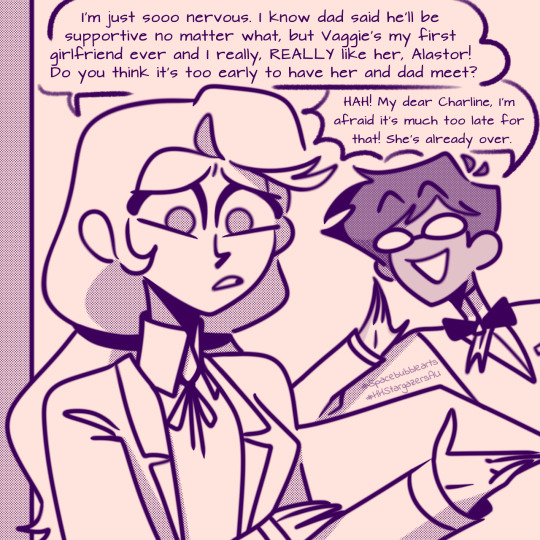

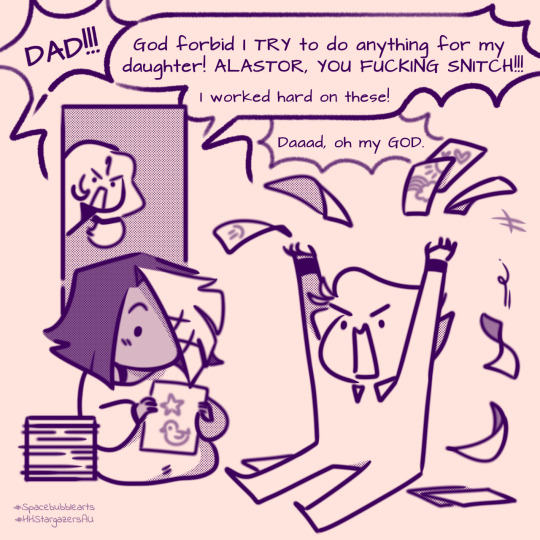
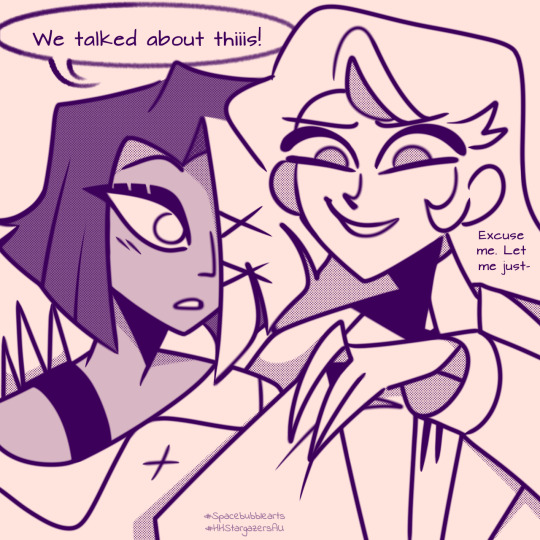



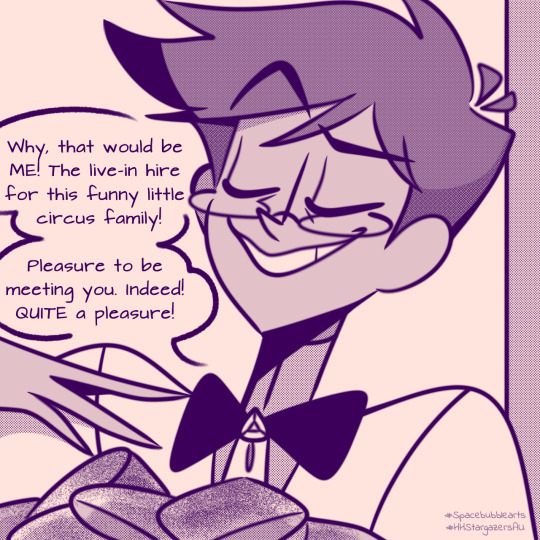
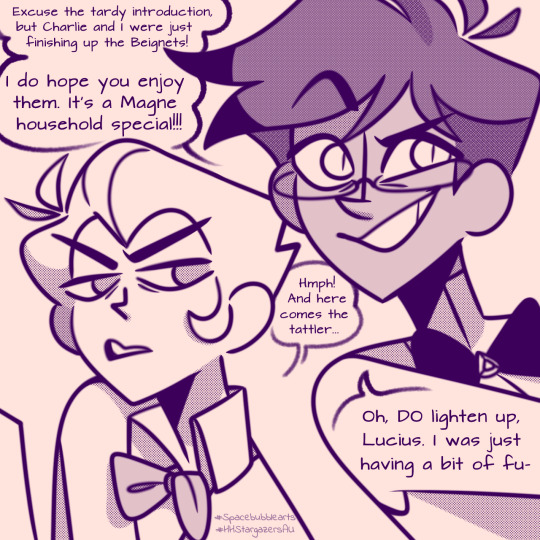

Welcome to my #HHStargazersAU! Stay Tuned~♡? -Bubbly💙
#spacebubblearts#HHStargazersAU#hazbin hotel#chaggie#radioapple#lucifer x alastor#charlie x vaggie#queerplatonic#or not as long as you enjoy this really#hazbin alastor#lucifer morningstar#charlie morningstar#hazbin vaggie#human au#angel#demons#let me COOK#world building#hopefully this was worth it#if ya'll want more do please let me know#I need the motivation haha TvT#vaggie x charlie#alastor x lucifer#appleradio#duckydeer#duckiedeer#humor#mystery#we barely scratched the surface of this AU and I am gonna BURST if I don't share it with anyone else I swear to GOD-#You think you know what's gonna happen? Excuse me while I laugh behind your back for a second NO YOU DON'T XD
2K notes
·
View notes
Text
What to give a fuck about,while writing your first draft!
I`ve posted a list about things you don´t need to give a fuck about while writing your first draft. Here are things you NEED TO CARE about! (in my opinion)
Your Authentic Voice: Don't let the fear of judgment or comparison stifle your unique voice. I know it´s hard,but try to write from your heart, and don't worry about perfection in the first draft. Let your authenticity shine through your words.
Your Story, Your Way: It's your narrative, your world, and your characters. Don't let external expectations or trends dictate how your story should unfold. Write the story you want to tell.
Progress Over Perfection: Your first draft is not the final product; it's the raw material for your masterpiece. Give a fuck about making progress, not achieving perfection. Embrace imperfections and understand that editing comes later.
Consistency and Routine: Discipline matters. Make a commitment to your writing routine and stick to it.
Feedback and Growth: While it's essential to protect your creative space during the first draft, be open to constructive feedback later on. Giving a f*ck about growth means you're willing to learn from others and improve your work.
Self-Compassion: Mistakes, writer's block, and self-doubt are all part of the process. Give a f*ck about being kind to yourself. Don't beat yourself up if the words don't flow perfectly every time. Keep pushing forward and remember that writing is a journey.
Remember, the first draft is your canvas, your playground. Don't bog yourself down with unnecessary worries.
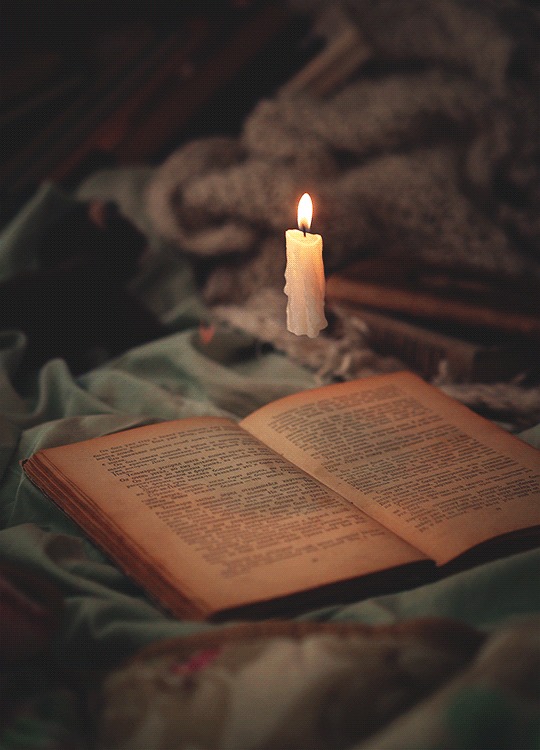
#writing#writblr#writing advice#writers block#just writer things#creative writing#fanfiction writing#writing motivation#writeblr#original writing#writing reference#writing tips#writers on tumblr#writing resources#writing tip#writing encouragement#writing community#writers#world building#point of view#editing#character creation#dialogue#mine.#words#writingtips#writingadvice
4K notes
·
View notes
Text
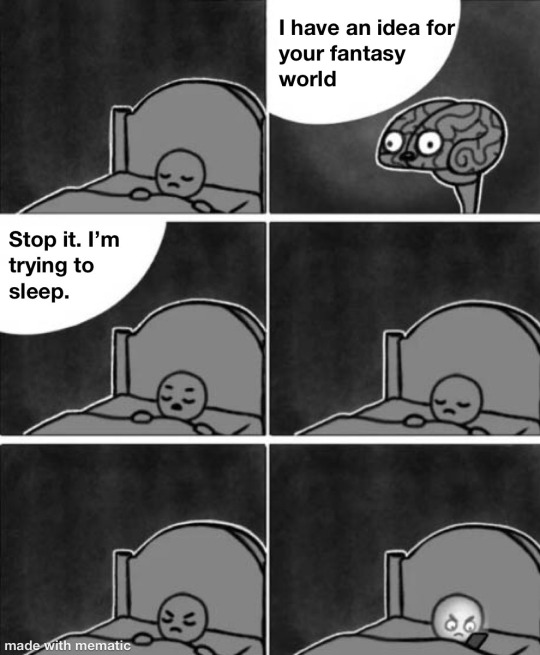
7K notes
·
View notes
Text
a list of 100+ buildings to put in your fantasy town
academy
adventurer's guild
alchemist
apiary
apothecary
aquarium
armory
art gallery
bakery
bank
barber
barracks
bathhouse
blacksmith
boathouse
book store
bookbinder
botanical garden
brothel
butcher
carpenter
cartographer
casino
castle
cobbler
coffee shop
council chamber
court house
crypt for the noble family
dentist
distillery
docks
dovecot
dyer
embassy
farmer's market
fighting pit
fishmonger
fortune teller
gallows
gatehouse
general store
graveyard
greenhouses
guard post
guildhall
gymnasium
haberdashery
haunted house
hedge maze
herbalist
hospice
hospital
house for sale
inn
jail
jeweller
leatherworker
library
locksmith
mail courier
manor house
market
mayor's house
monastery
morgue
museum
music shop
observatory
orchard
orphanage
outhouse
paper maker
pawn shop
pet shop
potion shop
potter
printmaker
quest board
residence
restricted zone
sawmill
school
scribe
sewer entrance
sheriff's office
shrine
silversmith
spa
speakeasy
spice merchant
sports stadium
stables
street market
tailor
tannery
tavern
tax collector
tea house
temple
textile shop
theatre
thieves guild
thrift store
tinker's workshop
town crier post
town square
townhall
toy store
trinket shop
warehouse
watchtower
water mill
weaver
well
wind mill
wishing well
wizard tower
#worldbuilding#setting prompts#writer resources#writing inspiration#writing prompts#scene settings#writing reference#writing ideas#prompt list#creative writing#writing community#writer prompts#writing tips#world#fantasy world#fantasy worldbuilding#high fantasy#world building#epic fantasy#writing fantasy
2K notes
·
View notes
Text
OH MY GOD PEOPLE Please please PLEASE
WATCH SCAVENGERS REIGN
This show is EVERYTHING people beg mainstream adult animation to be, is deep, emotional, inteligent and FUCKING BEAUTIFUL
I Will forever curse WBDiscovery and HBOMax for not promoting this
youtube
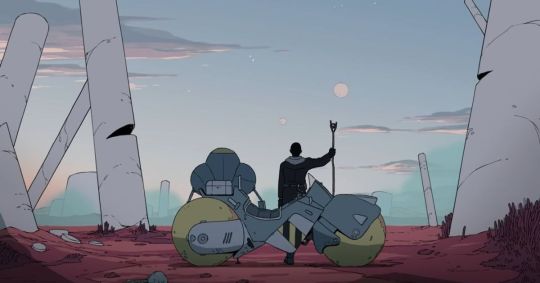
#adult animation#animated series#cartoon#adult cartoons#adult swim#warner bros#scifi#2d animation#world building#aliens#scelulative biology#streaming#art#robots#cartoon network#cartoon news#Warner animation#scavengers reign#Youtube
2K notes
·
View notes
Text
on worldbuilding, and what people think is going on
there is one facet of fantasy worldbuilding that is, to me, the most interesting and essential but i don't see it come up in worldbuilding guides or writing prompts or anything, and that is the question of:
what do the inhabitants of your world believe about how the world works, and how are they wrong? a lot of fantasy media will set up their cosmology, gods, magic systems, planar systems, concepts of the afterlife, &c., and proceed as though the inhabitants of the world know and understand them.
from someone whose entire academic career is focused on studying human culture in various regions and time periods, with a focus on belief systems (religion, occultism, mythology, folklore): that sort of worldbuilding is unrealistic and missing out on so much fun.
people are always seeking new understanding about how the world works, and they are mostly wrong. how many models of the solar system were proposed before we reached our current one? look at the long, turbulent history of medicine and our various bizarre models for understanding the human body and how to fix it. so many religions and occult/magical traditions arise from people disagreeing with or adapting various models of the world based on new ideas, methods, technologies. many of them are wrong, but all of them are interesting and reflect a lot about the culture, beliefs, values, and fears of the people creating/practising them.
there is so much more to the story of what people believe about the world than just what is true.
to be clear: i think it's fine and important for the author to have a coherent explanation for where magic comes from or who the gods are, so they can maintain consistency in their story. but they should also be asking what people in the world (especially different people, in different regions/nations and different times) think is happening when they do magic, or say a prayer, or practise medicine, or grieve their dead. it is a rich vein for conflict between individuals and nations alike when two models of the world disagree. it is fascinating how different magic systems might develop according to different underlying beliefs.
personally, i think it is the most fun to spawn many diverse models of the world, but give none of them the 'right' answer.
(bonus points if you also have a thriving academic system in the world with its own theory, research, and discourse between factions! as an academic, it is very fun to imagine fictional academic debate over the topics i'm worldbuilding. sometimes i will be working out details for some underlying mechanic of the world and start imagining the papers being written by scholars researching it)
2K notes
·
View notes